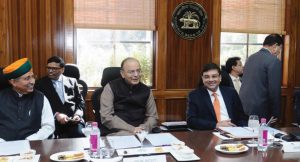 The Union Finance Minister, Arun Jaitley, at an event organised by the US-India Strategic and Partnership Forum had went on to comment, “The central bank looked the other way as the bank credit growth in one of these years was 31per cent, against the normal trend of 14per cent. I do not know what the central bank was doing. It was a regulator. They kept pushing truth below the carpet.” Similarly, Dr. Viral V Acharya, Deputy Governor of RBI during his AD Shroff Lecture in Mumbai on October 26, 2018, had commented, “Using central bank reserves to pay government obligations is not a positive development and the concept of excess reserves is certainly open to debate. It weakens the balance sheet of the central bank.” The deputy governor has made it clear in his statement where said, “As many parts of the world today await greater government respect for central bank independence. The Governments that do not respect central bank independence will sooner or later incur the wrath of financial markets, ignite economic fire, and come to rue the day they undermined an important regulatory institution.”
The Union Finance Minister, Arun Jaitley, at an event organised by the US-India Strategic and Partnership Forum had went on to comment, “The central bank looked the other way as the bank credit growth in one of these years was 31per cent, against the normal trend of 14per cent. I do not know what the central bank was doing. It was a regulator. They kept pushing truth below the carpet.” Similarly, Dr. Viral V Acharya, Deputy Governor of RBI during his AD Shroff Lecture in Mumbai on October 26, 2018, had commented, “Using central bank reserves to pay government obligations is not a positive development and the concept of excess reserves is certainly open to debate. It weakens the balance sheet of the central bank.” The deputy governor has made it clear in his statement where said, “As many parts of the world today await greater government respect for central bank independence. The Governments that do not respect central bank independence will sooner or later incur the wrath of financial markets, ignite economic fire, and come to rue the day they undermined an important regulatory institution.”
The meeting of RBI Board on November 19 went on for nine hours sending a signal that all was well between the RBI and the Government. The sentiment was such that the Indian rupee rose and bonds gained. It is learnt that the Reserve Bank of India will now set up an expert committee comprising members appointed jointly with the Union Government. The committee will look into the “excess” capital supposed to be held by the central bank. The RBI board has decided to set up a high-powered committee to examine issues related to surplus capital of 9.69 lakh crore with the central bank and advised it to consider a scheme for restructuring stressed assets in the MSME sector. The nine-hour long meeting of the board, also decided that the Board for Financial Supervision (BFS) would examine the issues concerning the banks that are under the Prompt Corrective Action framework.
Defending RBI
The government claims that the RBI holds 3,60,000 crore by way of excess capital which should be transferred to it. But RBI officials, including Governor Urjit Patel, have been defending the need for the bank to hold a strong balance sheet to enable the country withstand financial crises and external shocks. Having adequate reserves to bear any losses that arise from central bank operations and having appropriate rules to allocate profits (including rules that govern the accumulation of capital and reserves) is considered an important part of central bank’s independence from the government. A final issue is one of regulatory scope, the most recent case in point being the recommendation to bypass the central bank’s powers over payment and settlement systems by appointing a separate payments regulator. The Reserve Bank has published its note of dissent against this recommendation on October 19, 2018.
Next RBI meeting on Dec 14
The next meeting of the board is likely to be held on December 14. At the marathon meeting of the RBI board, RBI Governor Urjit Patel came face to face with government nominee directors — Economic Affairs Secretary Subhash Chandra Garg and Financial Services Secretary Rajiv Kumar and independent member S Gurumurthy. The next meeting is going to be held when the election process in few state assemblies would be over. However, some sort of truce, though temporary, had come out as the meeting ended on a conciliatory note with the central bank agreeing to set up a panel on sharing surplus reserves and restructure loans of small businesses up to 25 crore and the RBI would pump in 8,000 crore into the system.
Invoking Section 7
There were apprehensions that the government would invoke Section 7 of the Reserve Bank of India Act to ask the central bank to hand over a part of its surplus reserves to put that to more productive use. The government’s viewpoint seems that most central banks around the world keep 13 per cent to 14 per cent of their assets as reserve, compared with the Reserve Bank’s 27 per cent. However, Subhash Chandra Garg, Secretary of the Department of Economic Affairs, through a tweet set all speculations to rest. He tweeted: “A lot of misinformed speculation is going around in media. The government’s fiscal math is completely on track. There is no proposal to ask RBI to transfer 3.6 or 1 lakh crore, as speculated.” Confident of meeting fiscal deficit target, the government on November 9 clarified it is not seeking transfer of 3.6 lakh crore reserves from the RBI and the only proposal under discussion is to fix appropriate economic capital framework of the central bank.
On the fiscal road map, he said the government will stick to the fiscal deficit target of 3.3 per cent for the current financial year. “Government’s FD (fiscal deficit) in FY 2013-14 was 5.1per cent. From 2014-15 onwards, Government has succeeded in bringing it down substantially. We will end the FY 2018-19 with FD of 3.3 per cent. Government has actually foregone 70,000 crore of budgeted market borrowing this year,” he said. Garg further said the only proposal “under discussion is to fix appropriate economic capital framework of RBI”. The clarification came amidst report that the government is seeking transfer of at least a third of Reserve Bank’s 9.6 lakh crore reserves. Besides, it has also been pointed out that the government wants the RBI to part with most of its profit as dividend. The government’s demand is expected to further fuel tensions with the RBI, which has been pushing back any moves that curtail the central bank’s independence.
Lull before storm
But to think that differences between the RBI and the government have eased out would not be a correct assessment because when committees are formed, it only means buying time and lingering the issues. It is not a solution. With this all eyes would be on December 14, 2018 which would show if the ongoing differences between the Reserve Bank of India and the Government ease out or lead to further confrontation. In the meanwhile, we can say that it is a lull before a storm which seems imminent in near future.
letters@tehelka.com











